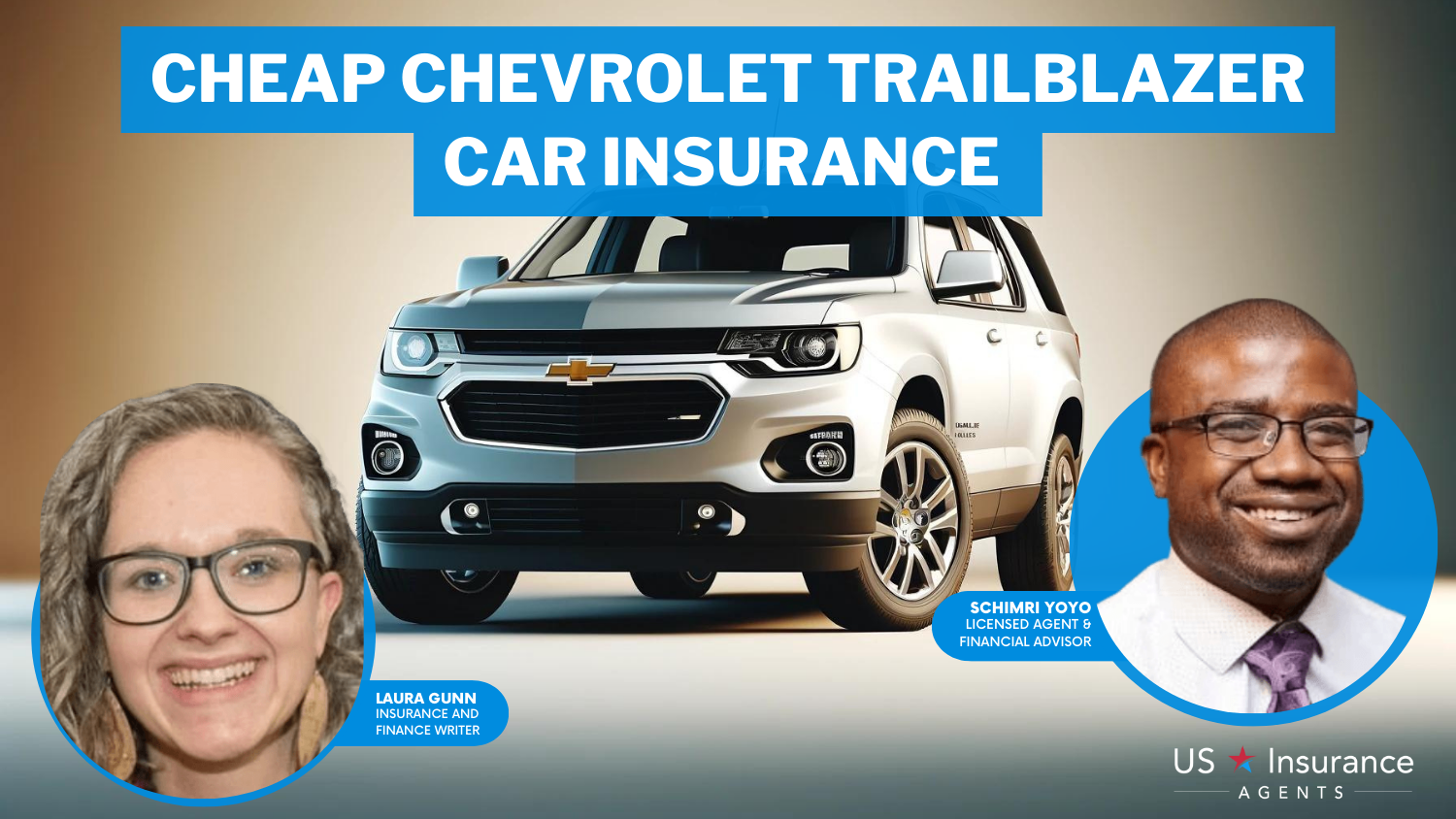Can I get car insurance for a self-driving car?
Exploring the Possibilities: Can I Get Car Insurance for a Self-Driving Car? Unveiling the answers to the challenges and options surrounding insuring autonomous vehicles in today's ever-evolving insurance landscape.
Read more Secured with SHA-256 Encryption





Table of Contents
Table of Contents


Insurance Claims Support & Sr. Adjuster
Kalyn grew up in an insurance family with a grandfather, aunt, and uncle leading successful careers as insurance agents. She soon found she has similar interests and followed in their footsteps. After spending about ten years working in the insurance industry as both an appraiser dispatcher and a senior property claims adjuster, she decided to combine her years of insurance experience with another...
Kalyn Johnson


Licensed Insurance Agent
Chris is the founder of Abrams Insurance Solutions and Marcan Insurance, which provide personal financial analysis and planning services for families and small businesses across the U.S. His companies represent nearly 100 of the top-rated insurance companies. Chris has been a licensed insurance agent since 2009 and has active insurance licenses in all 50 U.S. states and D.C. Chris works tireles...
Chris Abrams
Updated September 2024
With the rapid advancement of technology, the concept of self-driving cars is no longer confined to the realm of science fiction. Self-driving cars are becoming a reality, and with that comes the need for appropriate car insurance. In this article, we will explore the ins and outs of car insurance for self-driving cars and how it differs from traditional car insurance policies. We will delve into the factors that affect insurance rates and compare insurance rates for traditional and self-driving cars. So, let’s dive in and explore the fascinating world of car insurance for self-driving cars!
Understanding Self-Driving Cars
Before we delve into the intricacies of car insurance for self-driving cars, it’s important to have a clear understanding of what self-driving cars are and how they work.
Self-driving cars have revolutionized the automotive industry with their promise of increased safety and convenience. These vehicles, also known as autonomous cars or driverless cars, are capable of operating without human intervention. They utilize a sophisticated combination of sensors, cameras, and advanced algorithms to navigate and make decisions on the road.
But what exactly is a self-driving car? At its core, it is a vehicle that can perceive its environment, interpret the data it collects, and make decisions based on that information. This ability to sense and respond to the surrounding environment is what sets self-driving cars apart from traditional vehicles.
What is a Self-Driving Car?
A self-driving car, also known as an autonomous car or driverless car, is a vehicle that is capable of operating without human intervention. It uses a variety of sensors, cameras, and advanced algorithms to navigate and make decisions on the road.
These vehicles are equipped with an array of sensors, including radar, lidar, and ultrasonic sensors, which allow them to perceive their surroundings. The data collected by these sensors is then processed by powerful onboard computers, which use complex algorithms to analyze the information and make decisions in real-time.
Self-driving cars are designed to mimic human driving behavior, but with the added advantage of being able to process vast amounts of data much faster than any human driver could. This allows them to make split-second decisions that can help prevent accidents and improve overall road safety.
How Do Self-Driving Cars Work?
Self-driving cars rely on a combination of sensors, cameras, radar, and lidar technology to perceive their environment. They continuously analyze data from these sensors and use complex algorithms to make real-time decisions, such as when to accelerate, brake, or change lanes. The goal is to create a safe and efficient driving experience while minimizing the risk of accidents.
One of the key components of a self-driving car is its sensor suite. This includes cameras, which provide visual information about the surrounding environment, radar, which uses radio waves to detect objects and measure their distance, and lidar, which uses laser beams to create a detailed 3D map of the car’s surroundings.
These sensors work together to create a comprehensive view of the car’s environment, allowing it to detect and track other vehicles, pedestrians, and obstacles in real-time. The data collected by the sensors is then processed by the car’s onboard computers, which use advanced algorithms to interpret the information and make decisions.
These decisions can range from simple tasks, such as maintaining a safe distance from the car in front, to more complex maneuvers, such as navigating through a busy intersection or changing lanes on a highway. The algorithms take into account a wide range of factors, including the car’s speed, direction, and the behavior of other road users, to ensure a safe and efficient driving experience.
While self-driving cars have made significant advancements in recent years, there are still many challenges to overcome before they can become a common sight on our roads. These challenges include regulatory hurdles, technological limitations, and public acceptance. However, with ongoing research and development, it is only a matter of time before self-driving cars become a reality for everyone.
Free Auto Insurance Comparison
Compare Quotes From Top Companies and Save
Secured with SHA-256 Encryption
The Current State of Car Insurance
Before we dive into the world of car insurance for self-driving cars, let’s take a moment to understand the current state of car insurance and how it works for traditional vehicles.
Traditional car insurance policies are designed to provide coverage for vehicles that are driven by human drivers. These policies typically cover liability, collision, and comprehensive coverage. Liability coverage protects the insured driver from financial responsibility if they cause an accident that results in injury or damage to another person’s property. Collision coverage, on the other hand, covers the cost of repairs or replacement if the insured vehicle is damaged in a collision. Lastly, comprehensive coverage protects against non-collision events such as theft, vandalism, or natural disasters.
When it comes to determining the premiums for these policies, insurance companies take into account various factors. These factors include the driver’s age, driving record, and the make and model of the vehicle. Younger drivers are often considered higher risk due to their lack of experience, while drivers with a history of accidents or traffic violations may also face higher premiums. Additionally, the make and model of the vehicle can impact insurance rates. Cars with higher horsepower or those that are more expensive to repair or replace may result in higher premiums.
Factors Influencing Car Insurance Rates
Several factors influence car insurance rates for traditional vehicles. These factors include the driver’s age, driving history, location, the make and model of the vehicle, and the level of coverage required. Let’s take a closer look at each of these factors:
1. Driver’s Age: Insurance companies consider age as a significant factor in determining insurance rates. Younger drivers, especially those under 25, are often charged higher premiums due to their lack of driving experience and higher likelihood of being involved in accidents.
2. Driving History: A driver’s past driving record plays a crucial role in determining their insurance rates. Drivers with a history of accidents, speeding tickets, or other traffic violations are considered higher risk and may face higher premiums as a result.
3. Location: The location where the insured vehicle is primarily driven and parked also affects insurance rates. Urban areas with higher traffic congestion and crime rates may result in higher premiums compared to rural areas with lower risk factors.
4. Make and Model of the Vehicle: Insurance companies take into account the make and model of the insured vehicle when determining rates. Cars with higher safety ratings and lower repair costs may result in lower premiums, while luxury or sports cars may come with higher insurance costs due to their increased risk of theft or accidents.
5. Level of Coverage Required: The level of coverage chosen by the insured also impacts insurance rates. Higher coverage limits and additional optional coverage, such as rental car reimbursement or roadside assistance, will result in higher premiums.
By considering these factors, insurance companies assess the level of risk associated with insuring a particular driver and vehicle. This risk assessment helps determine the appropriate premium to charge, ensuring that the insurer can cover potential claims while remaining financially viable.
Car Insurance for Self-Driving Cars
Now that we have a foundation of knowledge about self-driving cars and traditional car insurance, let’s explore how car insurance works for self-driving cars.
Self-driving cars, also known as autonomous vehicles, are revolutionizing the automotive industry. These vehicles are equipped with advanced technology that allows them to navigate and operate on their own, without the need for human intervention. As this technology continues to advance, it raises important questions about how car insurance will adapt to this new era of transportation.
Is Insurance Available for Self-Driving Cars?
Yes, insurance is available for self-driving cars. However, due to the unique nature of self-driving cars and the evolving technology, insurance policies for self-driving cars may differ from traditional car insurance policies. Insurers are gradually adapting their policies to accommodate the new challenges and risks associated with self-driving cars.
One of the key differences between traditional car insurance and insurance for self-driving cars is the shift in liability. In a traditional car accident, the driver is typically held responsible for any damages or injuries. However, in the case of self-driving cars, the liability may shift to the manufacturer or the software developer responsible for the autonomous technology. This shift in liability introduces new complexities that insurance companies must consider when designing policies for self-driving cars.
How Insurance Companies View Self-Driving Cars
Insurance companies view self-driving cars as both an opportunity and a challenge. On one hand, self-driving cars have the potential to significantly reduce accidents and improve road safety, leading to lower insurance claims. The advanced technology in these vehicles can detect and respond to potential hazards much faster than human drivers, minimizing the risk of collisions.
Furthermore, self-driving cars are designed to follow traffic laws and regulations meticulously, eliminating the factor of human error that often contributes to accidents. This increased safety can translate into lower insurance premiums for owners of self-driving cars.
On the other hand, there are still concerns about the reliability and safety of the technology, as well as potential legal and regulatory issues. While self-driving cars have shown promising results in various test scenarios, there have been instances where accidents involving autonomous vehicles have occurred. These incidents raise questions about the effectiveness of the technology and the responsibility of the parties involved.
Insurance companies are closely monitoring the development of self-driving cars and working with manufacturers and regulators to address these concerns. They are investing in research and data analysis to better understand the risks and benefits associated with insuring self-driving cars. This collaborative approach aims to create insurance policies that provide adequate coverage while promoting the adoption of autonomous vehicles.
In conclusion, car insurance for self-driving cars is an evolving field that requires careful consideration of the unique challenges and opportunities presented by this emerging technology. As the industry continues to innovate and adapt, insurance companies are working to develop policies that strike the right balance between providing coverage and encouraging the adoption of self-driving cars for a safer and more efficient future on the roads.
Factors Affecting Insurance for Self-Driving Cars
Several factors influence insurance rates for self-driving cars. Let’s delve into two key factors: safety and risk factors, and legal and regulatory considerations.
Safety and Risk Factors
One of the main factors that affect insurance rates for self-driving cars is the safety and risk profile of the vehicle. Insurance companies assess the reliability and performance of the self-driving technology, as well as the vehicle’s track record in terms of accidents and incidents. Vehicles with better safety records and advanced self-driving capabilities are likely to attract lower insurance premiums.
Legal and Regulatory Considerations
Legal and regulatory considerations also play a crucial role in shaping insurance rates for self-driving cars. The laws surrounding self-driving cars vary from state to state and from country to country. Insurance companies must navigate complex legal frameworks and stay abreast of evolving regulations to provide appropriate coverage for self-driving cars.
Free Auto Insurance Comparison
Compare Quotes From Top Companies and Save
Secured with SHA-256 Encryption
Comparing Insurance Rates for Traditional and Self-Driving Cars
Now that we have explored the various factors that affect insurance rates, let’s compare insurance rates for traditional and self-driving cars.
Cost Differences and Reasons
Insurance rates for self-driving cars can vary significantly from traditional car insurance rates. This is mainly due to the unique risks and uncertainties associated with self-driving technology. While self-driving cars have the potential to reduce accidents, there is still a degree of uncertainty regarding their long-term safety and reliability. Insurance rates for self-driving cars may also be influenced by the cost of repairing or replacing advanced technology components.
Potential Savings with Self-Driving Cars
Despite the potential differences in insurance rates, self-driving cars also offer the opportunity for potential savings. With fewer accidents and improved road safety, insurance companies may offer discounts or incentives for owners of self-driving cars. This can result in long-term savings for individuals and businesses alike.
In conclusion, car insurance for self-driving cars is a rapidly evolving field. While insurance is available for self-driving cars, it remains an area of ongoing development and adaptation for insurers. The unique risks and uncertainties associated with self-driving technology necessitate a tailored approach to insurance coverage. As the technology continues to advance and regulations develop, we can expect further refinements in car insurance policies for self-driving cars. So, if you own or plan to own a self-driving car, it’s essential to stay informed and work with insurance providers who understand the intricacies of this emerging field.
Frequently Asked Questions
Can I get car insurance for a self-driving car?
Yes, car insurance is available for self-driving cars. However, the coverage and premiums may vary depending on the insurance provider and the specific self-driving technology used in the car.
What factors affect the cost of car insurance for self-driving cars?
The cost of car insurance for self-driving cars can be influenced by factors such as the level of autonomy of the vehicle, the safety features and technology installed, the driving record of the owner, and the insurance company’s policies.
Are self-driving cars more expensive to insure compared to traditional cars?
Generally, self-driving cars may be more expensive to insure due to the advanced technology involved and the potential higher costs of repairs or replacements. However, this can vary depending on the specific circumstances and insurance provider.
Do self-driving cars require additional coverage?
Self-driving cars may require additional coverage beyond the standard auto insurance policy. This could include coverage for cyber risks, technology malfunctions, or specialized repairs and maintenance associated with the self-driving features.
Do insurance companies offer discounts for self-driving cars?
Some insurance companies may offer discounts or incentives for owning a self-driving car, especially if the vehicle has advanced safety features that reduce the risk of accidents. It is recommended to check with individual insurance providers for any available discounts.
How do insurance claims work for self-driving cars?
In case of an accident involving a self-driving car, the insurance claim process works similarly to traditional cars. The insurance company will assess the circumstances, liability, and damages, taking into account the specific self-driving technology involved. It is important to promptly report any incidents to the insurance provider.
Are there any specific insurance requirements for self-driving cars?
Insurance requirements for self-driving cars can vary by jurisdiction. Some regions may have specific regulations or minimum coverage requirements for autonomous vehicles. It is advisable to consult with local authorities or an insurance professional to understand the specific requirements in your area.
Get a FREE Quote in Minutes
Insurance rates change constantly — we help you stay ahead by making it easy to compare top options and save.



